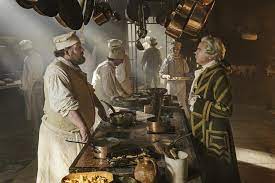Delicious:”A recipe for revolution”
- eclectic Stefan

- Jan 26, 2022
- 7 min read
Updated: Feb 16, 2025

Dining out means different things to different people. You can enjoy a barbecued Asian chicken salad from your local cafe; a refined restaurant meal featuring Braised Macleay Valley Rabbit and Truffled Chestnut Loin ‘Porchetta’ on Buckwheat Polenta accompanied by a 2004 Tommaso Bussola Valpolicella Classico Superiore wine; and a flourless Amedei Chocolate Torte, Drunken Prunes in Grappa and Black Truffle Honey Gelato for dessert as part of a top-rated 12 course degustation dinner.
Your food will be served on plates with cutlery and a serviette; the menu will be printed on quality paper or written on a blackboard; and the food will be cooked by a qualified and, depending on the venue, a renowned chef known by one name only, such as Jamie, Heston or Tetsuya. Furthermore, you eat these meals outside the confines of your house. We simply take this for granted.
That may all sound like I’m stating the bleeding obvious. But all these features of dining in a cafe or restaurant were not the norm. Creating extraordinary culinary dishes added a degree of difficulty that was mind-boggling if you chose to recreate these menu items at home. Luckily, that’s why we have chefs.
In provincial France in 1789 immediately preceding the fall of the Bastille and the beginning of the French Revolution, master chef Manceron (Grégory Gadebois) is lauded by the Duke of Chamfort (Benjamin Levornhe) for his culinary skills. Extravagant and plentiful dishes are served when we meet Manceron and the Duke for a banquet with guests from the court of the King of France.
Manceron, The Duke of Chamfort & master chef Manceron in his realm
The mention of Truffled Chestnut Loin and Black Truffle Honey Gelato takes us immediately to Manceron and his fall from grace in the Duke’s household and, more importantly, in the realm of the lords, ladies and clergy who will determine whether the Duke is invited to join the splendour of the court of Louis XVI.
Although the feast prepared by Manceron is praised by everyone attending the banquet, one derogatory remark from a clergyman about a new dish with potatoes and truffles being fit only as food for pigs immediately reverses the tone of the conversation from praise to derision. Any food that comes from beneath the ground is considered vulgar and unworthy to be served for nobility. Make no mistake about the clergy. This is not your ordinary parish priest. Before the French Revolution, clergy were part of the First Estate and had power, land and did not pay taxes.
The Duke is furious. Manceron refuses to apologise and leaves the Duke’s service and, having lost his taste for cooking, returns with his son Benjamin (Lorenzo Lefebvre) to his family home. A mysterious woman, Louise (Isabelle Carré), with an uncertain background appears on his doorstep and insists that she becomes Manceron’s assistant to learn a chef’s skills and to respark his love of food and cooking.
Manceron is unimpressed and refuses to accept her suggestion. Louise acts as an agent of disruption. She challenges conventional thinking about a woman’s position and rights in society. Louise is determined, confident and maintains self-esteem despite being derided by Manceron and his traditional views about what she should do and be.
Manceron is undecided and doubtful about her background story and his suspicions are well founded. Louise’s story is worth discovering. It explains a lot about her unyielding views and positivity despite significant barriers to her gender and perceived social standing.

Benjamin, Louise & Manceron--the future of gastronomy
Gradually, Manceron, Louise and Benjamin maintain a balance between their opposing views. Louise and Benjamin collaborate to convince Manceron that individual tables for diners in a shared dining room with menus and a choice of menu items depending on how much customers want to pay make good business sense.
Sure enough, their plans and decisions result in a successful venture that is open to people of all classes, not just the wealthy nobles. Changes include separate tables, not communal, serving food on plates, people paying according to how much they eat, menus, eating with other people you don’t know, using local ingredients, provincial food, honest in its origins rather than confected as a type of showmanship. The Duke's rebuff becomes Manceron's revenge that is not served cold but served with humility and intent.
The avalanche of changes in culinary practices that appear in Delicious may not have been orchestrated by one group of people in one place in the one time but that doesn’t matter because it’s not just about food, it’s about the people who prepare it, the people who consume it, the ingredients, and the way in which you treat the process of making the food. It’s about life’s essence.

Louise’s accommodation adds an interesting aside to the conditions in which people lived next to and below their animals’ quarters. Animals in close quarters with humans transferred diseases, such as measles and smallpox/cowpox. Jared Diamond’s book Guns, Germs and Steel provides a clear account of the impact on humans of close contact with animals.
Manceron and Louise’s revenge against the Duke, who is an emblem of the nobility, embraces the change happening in French society. The privileged classes will soon discover that the era of outrageous plentitude and wasteful practices, where a banquet is served with a surfeit of food and is meant for show rather than to satisfy one’s hunger, will lead to their demise. The needs of the starving commoners will outweigh the excesses of the gentry. Hungry stomachs that make noise are a metaphor not only for a rumbling stomach caused by hunger but equally as the rumble of revolution and the downfall of the aristocracy.
Delicious includes insider jokes included for a contemporary audience about food practices and new types of foods, such as deep-fried potato strips that were derided when first invented but are commonplace now. Food, such as truffles, tubers and others vegetables grown below the ground, that was considered unfit for consumption and considered food for pigs, are highly prized and expensive in modern society.
The aristocracy; Manceron & Louise with Manceron's delicious truffle and potato treats
The food revolution happening in Manceron’s kitchen is shadowed by the cultural turmoil, class struggles and social upheaval of the impending French Revolution. The French Revolution is not a trifle to be ignored. The love of food, the changes in styles of cooking and the ability of people to enjoy each other’s company while celebrating food regardless of social position is the success story in the movie. Gentle touches, rather than forceful intrusions, allude to the egalitarian revolution impinging on class and status.
Manceron allows waifs to “steal” his freshly baked bread because otherwise they would take everything from him. More than baking bread, he makes peace and the farmers then share their flour for him to make bread which they, once again, steal. Manceron’s metaphor about bread provides a sense of egalitarianism that will explode with the French Revolution. His views and actions are a microcosm of the inequities that existed before the French Revolution. Bread making signals a recipe for change of the highest order for a simple yet essential food. It indicates how ordinary people had been worn down to the point where they had enough and stood against oppression and stated firmly, “Down with privilege”.
There is one interesting scene that dissolves the barrier between the classes when the Duke and Manceron share a food moment. During a midnight meal in the Duke's basement kitchen, they contemplate their love of food and how food should be eaten and enjoyed. Chamfort and Manceron share communion as gourmands beyond the distinctions of class and rank that separate them. For them, food is the common denominator in a system where the divisor is anything but common.
Official Trailer Delicious/Delicieux (French with subtitles)
All of that is secondary to the recipe for success in Delicious. Manceron’s food revolution happens in his kitchen. Manceron innovates with his food ideas; Louise assists and develops skills taught by her mentor Manceron and drives him to be the best chef he can be; and, along with Benjamin, they provide ideas about setting up a restaurant in a way that reflects how we dine-out to this day.

I haven’t felt as lifted watching a film like Delicious for ages. Delicious made me feel lighter. What else could I possibly do after watching the delightful food film Delicious except have a sumptuous meal with a delectable wine. A perfect match.
Delicious: Current release in cinemas (February 2022)
Photo stills & official trailer © Samuel Goldwyn Films
FILM EXTRAS: TASTY FILM TREATS

Tampopo (1985, Japan)
Two Japanese milk-truck drivers (Tsutomu Yamazaki, Ken Watanabe) help a restaurant owner (Nobuko Miyamoto) learn how to cook great noodles and search for the perfect egg noodles. Tampopo features the most erotic and sensuous scene involving a couple and one raw egg. WATCH Tampopo

Babette’s Feast (1988, Denmark)
Pious sisters Martine (Birgitte Federspiel) and Philippa (Bodil Kjer) grow to spinsterhood under the wrathful eye of their strict pastor father on the forbidding and desolate coast of Jutland, until one day, Philippa's former suitor sends a Parisian refugee named Babette (Stéphane Audran) to serve as the family cook. Babette's lavish celebratory banquet tempts the family's dwindling congregation, who abjure such fleshly pleasures as fine foods and wines. A feast for the eyes. WATCH Babette's Feast

Eat Drink Man Woman (1994, Taiwan/United States)
Master Chef Chu (Sihung Lung) is semi-retired and lives at home with his three unmarried daughters, Jia-Jen (Kuei-Mei Yang), a religious chemistry teacher; Jia-Chien (Chien-Lien Wu), an airline executive; and Jia-Ning (Yu-wen Wang), an employee at a fast-food joint. Life at the family's house revolves heavily around preparing and eating an elaborate dinner every Sunday. The stability of these meals gives them all strength as they deal with new romantic relationships and disappointments.

Julie and Julia (2009, United States)
New Yorker Julie Powell (Amy Adams) embarks on a daring project: she vows to prepare all 524 recipes in Julia Childs' landmark cookbook, "Mastering the Art of French Cooking." Intertwined with Julie's story is the true tale of how Julia Child (Meryl Streep) herself conquered French cuisine with passion, fearlessness, and plenty of butter. WATCH Julie and Julia










